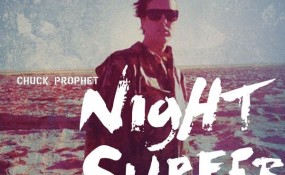CD Review: Chuck Prophet – Night Surfer (Yep Roc)
Music, Reviews
There’s a neat symmetry, career-wise, in Chuck Prophet’s latest release Night Surfer (YepRoc). By my count, it’s his twelfth album in a solo ride now in its twenty-fourth year. A quarter century in, and Prophet may have just cut the greatest album of his career. Twenty-four years on from his first release, Dylan was in the writer’s block alcohol blackout of Knocked Out Loaded (studio album no. 23); Springsteen was in a drought-ridden place, two years on from Joad and five years away from The Rising (his no. 12); meanwhile, we find Tom Petty perched between two of his least well-regarded albums, Echo (12) and The Last DJ (13). In all three cases, their best work was behind them. Does that make Prophet a late bloomer? Perhaps. But it’s seventeen years since his red raw guitar masterpiece Homemade Blood and he’s been on one burning creative streak now for at least three outstanding albums in a row. It just keeps getting hotter.
Enough rock history, though, because Prophet is too nimble to be categorised as a classic rocker and, besides, Night Surfer is an album with a cautious and sometimes despairing eye on the future. From the ‘Countrified Inner City Technological Man’ of the opening track, via the teenage billionaires of Silicon Valley (‘They Don’t Know About Me and You’), to the monstrous consumer of ‘Felony Glamor’, the album conjures up a vivid array of characters to populate these 12 songs. Prophet was never one to cruise the ever decreasing circles frequented by your typical introspective singer-songwriter either, and the lyrics catch details of the real world from unexpected angles. He and his co-writer, the poet klipschutz, have forged a rich songwriting partnership over the years: laconic lyric perfectly matches wry vocal, and together they are able to skewer an unexpected truth from fifty paces. A case in point is ‘Truth Will Out’ which recasts the story of Amanda Knox by flipping between murder, arrest and trial, and an imagined future some years down the line. The bone-dry, semi-spoken verses alternate with an increasingly desperate vocal in the chorus, while a rising, keening bridge leaves the drama cliff-hanging beautifully.
Musically, the album is undoubtedly the most adventurous record he’s cut. Co-producer Brad Jones arranged the strings for Chuck’s recent tour showcasing Temple Beautiful, and they have carried over seamlessly into Night Surfer, underscoring much of the album, but particularly vivid in the pizzicato violin on the semi-autobiographical ’Lonely Desolation,’ where a sunny pop tune is subverted by the dark lyrical undertow. The strings draw attention to Prophet’s natural melodicism, and also, perhaps unexpectedly, showcase his voice in many places: he blesses the sly ‘Guilty as a Saint’ with some beautiful falsetto swoops. Maybe he’s pulled back on the throttle a bit, but the result is a sweeter and fuller vocal tone throughout.
A quick word about a couple of collaborators. James DePrato for some time now has been Chuck’s musical foil on stage, and the twin guitar harmonies they reel off so effortlessly night after night have carried over intact into the studio. There are some very rich, very intricate arrangements in places. If Chuck’s eased off on the pedal board a little, it’s only in the interests of something more subtle, and the result is a far more varied musical palette. Some credit is also due to Peter Buck, whose sparkling jangle lights up at least half of the album. And listen to those drums: often complex, never fussy, always propulsive, Tubes man Prairie Prince gives songs like the glorious ‘Laughing on the Inside’ and blow-out closer ‘Love Is the Only Thing’ a terrific momentum.
Prophet has always worn his influences on his sleeve. ‘Love Is the Only Thing’, with its warped ‘Jean Genie’ riff and glam rock mob-handed vocals, is a case in point. Give it a cheerier lyric and it could be the UK’s Christmas no. 1 if someone would turn the clock back forty years. There’s a punkier feel to ‘Ford Econoline’ and even a touch of something progressive in ‘They Don’t Know…’, before it turns into the kind of soaring anthem Petty would kill for, 35 years on from ‘Even the Losers’. You can always play spot the influences with Chuck, but the charming thing is that he wears them all so lightly and shamelessly, and while you can identify a Lou Reedism here, a Kinks nod there, the truth is, as another of his idols once said, he ‘don’t sound like nobody’.
We should be grateful that, a quarter century on, in a music business so hostile to original, creative artists, Chuck Prophet remains excited about the process of making records. Oh, and did I mention this album has so many hooks it surely can’t be legal? Old faithful fans will welcome the new directions he’s navigating; new listeners are dropping in at an opportune moment. Surf’s up.























